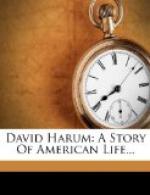“‘Wa’al,’ I says, ’I don’t ask no man to go agin his conscience, but it wouldn’t be no very glarin’ transgression on your part, would it, if I was to go up to the barn all alone by myself an’ look at the hoss?’ I c’d see,” continued Mr. Harum, “that his face kind o’ brightened up at that, but he took his time to answer. ‘Wa’al,’ he says fin’ly, ’I don’t want to lay down no law fer you, an’ if you don’t see no harm in’t, I guess the’ ain’t nuthin’ to prevent ye.’ So I got down an’ started fer the barn, an’—he, he, he!—when I’d got about a rod he hollered after me, ‘He’s in the end stall,’ he says.
“Wa’al,” the narrator proceeded, “I looked the critter over an’ made up my mind about what he was wuth to me, an’ went back an’ got in, an’ drove into the yard, an’ turned ‘round, an’ drew up agin ’longside the stoop. ‘Lizer looked up at me in an askin’ kind of a way, but he didn’t say anythin’.
“‘I s’pose,’ I says, ‘that you wouldn’t want me to say anythin’ more to ye, an’ I may ‘s well jog along back.’
“‘Wa’al,’ he says, ‘I can’t very well help hearin’ ye, kin I, if you got anythin’ to say?’
“‘Wa’al,’ I says, ’the hoss ain’t exac’ly what I expected to find, nor jest what I’m lookin’ fer; but I don’t say I wouldn’t ‘a’ made a deal with ye if the price had ben right, an’ it hadn’t ben Sunday.’ I reckon,” said David with a wink at John, “that that there foot o’ his’n must ‘a’ give him an extry twinge the way he wriggled in his chair; but I couldn’t break his lockjaw yit. So I gathered up the lines an’ took out the whip, an’ made all the motions to go, an’ then I kind o’ stopped an’ says, ‘I don’t want you to go agin your princ’ples nor the law an’ gosp’l on my account, but the’ can’t be no harm in s’posin’ a case, can the’?’ No, he allowed that s’posin’ wa’n’t jest the same as doin’. ‘Wa’al,’ says I, ‘now s’posin’ I’d come up here yestidy as I have to-day, an’ looked your hoss over, an’ said to you, “What price do you put on him?” what do you s’pose you’d ‘a’ said?’
“‘Wa’al,’ he said, ‘puttin’ it that way, I s’pose I’d ‘a’ said one-seventy.’
“‘Yes,’ I says, ‘an’ then agin, if I’d said that he wa’n’t wuth that money to me, not bein’ jest what I wanted—an’ so he ain’t—but that I’d give one-forty, cash, what do you s’pose you’d ‘a’ said?’
“‘Wa’al,’ he says, givin’ a hitch, ’of course I don’t know jest what I would have said, but I guess,’ he says, ’’t I’d ‘a’ said if you’ll make it one-fifty you c’n have the hoss.’
“‘Wa’al, now,’ I says, ‘s’posin’ I was to send Dick Larrabee up here in the mornin’ with the money, what do you s’pose you’d do?’
“‘I s’pose I’d let him go,’ says ’Lizer.
“‘All right,’ I says, an’ off I put. That conscience o’ ’Lizer’s,” remarked Mr. Harum in conclusion, “is wuth its weight in gold, jest about.”
“David Harum,” declared Aunt Polly, “you’d ort to be ‘shamed o’ yourself.”




